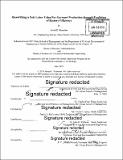Quantifying a fair labor value for garment production through prediction of factory efficiency
Author(s)
Mourabet, Jawad E.
Download1220951457-MIT.pdf (7.819Mb)
Other Contributors
Sloan School of Management.
Massachusetts Institute of Technology. Department of Civil and Environmental Engineering.
Leaders for Global Operations Program.
Advisor
Charles Fine, Vivek F. Farias and John R. Williams.
Terms of use
Metadata
Show full item recordAbstract
Li&Fung is a world leader in logistics, sourcing, and procurement; connecting manufacturing vendors with major retail brands. Recently, there has been an increasing consumer demand for more sustainably produced and sourced garments. When sourcing a garment, costs such as materials, shipping, and taxes are widely understood, but there is a lot of ambiguity on labor's contribution to the cost breakdown. This ambiguity can lead to incorrect garment pricing which can result in factories using cost cutting measures in order to meet production agreements. This in turn can lead to poor production quality as well as adverse conditions to the health and wellbeing of workers. Through advancements in technology and data collection it has become possible to digitize a large portion of the sourcing process, allowing for a quantifiable approach to costing out labor. The primary goal of this thesis is to detail a methodology to quantify a fair labor value for new orders placed with Li&Fung. A fair labor wage, in accordance with the UN International Labor Organization (ILO), will satisfy the basic needs of workers and their families while providing some discretionary income. The resulting framework was used to create a model that leverages Li&Fung's internal supplier data currently being collected, as well as external environmental data that drives garment production efficiency. The model provides a standardized, intuitive method for both Li&Fung merchandisers and their customers to determine what a fair labor value is when producing a garment. Additionally, Li&Fung can leverage the tool as a method to attract new brands who are interested in offering fair trade products to their customers, but do not have the capacity or supply chain expertise to do so.
Description
Thesis: M.B.A., Massachusetts Institute of Technology, Sloan School of Management, in conjunction with the Leaders for Global Operations Program at MIT, June, 2019 Thesis: S.M., Massachusetts Institute of Technology, Department of Civil and Environmental Engineering, in conjunction with the Leaders for Global Operations Program at MIT, June, 2019 Cataloged from the official PDF of thesis. Includes bibliographical references (pages 65-66).
Date issued
2019Department
Sloan School of Management; Massachusetts Institute of Technology. Department of Civil and Environmental Engineering; Leaders for Global Operations Program at MITPublisher
Massachusetts Institute of Technology
Keywords
Sloan School of Management., Civil and Environmental Engineering., Leaders for Global Operations Program.